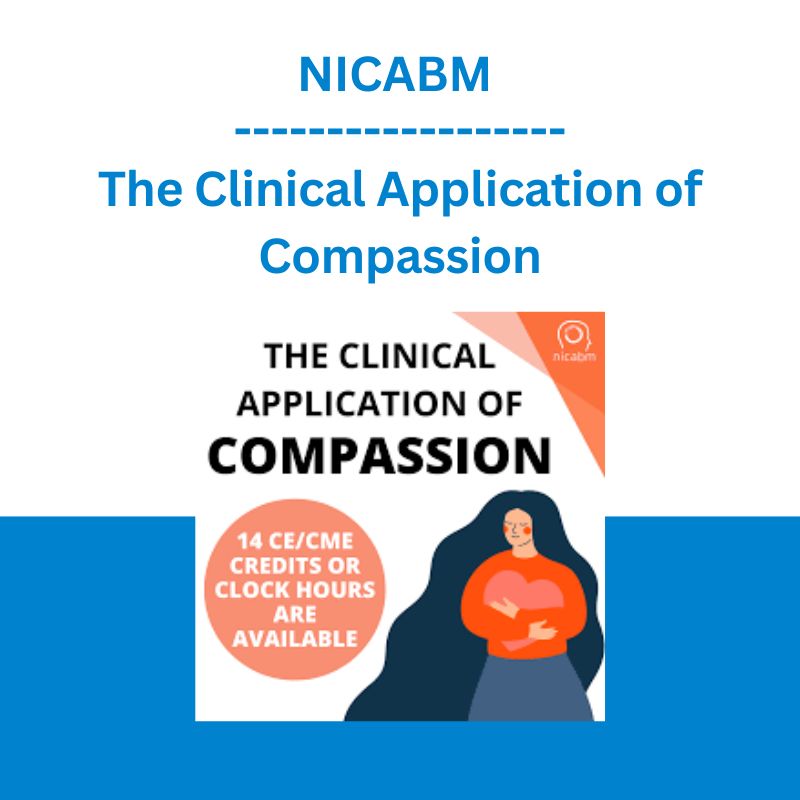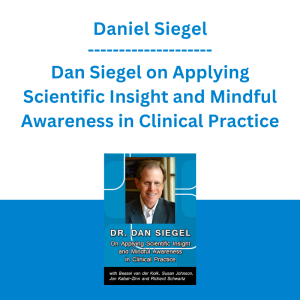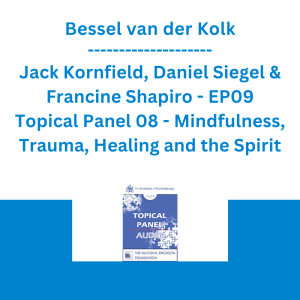*** Proof of Product ***

Exploring the Essential Features of “NICABM – The Clinical Application of Compassion”
A 4-Module Series on Integrating Compassion-Oriented Treatment into Clinical Practice
What do we do when our go-to strategies – the strategies we rely on most to work with depression, anxiety, shame, fear, anger, and especially trauma – don’t work as well as we’d like them to?
What if there was one key element that could open up those places where we so often get stuck – even with our most challenging clients?
I’m talking about compassion.
You see, the way we now understand how compassion can affect the brain and body can be game-changing for helping clients heal. Not only that, it’s constantly evolving.
Promising clinical research into the healing power of compassion can take our treatment strategies in a new direction.
This can improve our work with so many clients, especially when we start seeing a client’s progress stall, and we begin feeling like our tried-and-true interventions just aren’t working.
You see, we now have research into compassion that simply didn’t exist, even just a short time ago.
Looking back, there were probably a lot of things about compassion that seemed intuitive to us, but we had no science to back them up.
Now we have that science.
Researchers studying compassion now have insights into what might be happening in the brain and in the nervous system when people practice compassion.
Not only that, we also understand compassion’s impact on the treatment of trauma much better than we did even five years ago.
And finally, we’ve learned more ways to work with the healing power of compassion. Ways to apply it that can help people who are struggling with anxiety and depression.
Compassion-oriented therapy is opening up new opportunities for practitioners to be even more effective with their patients.
But integrating compassion into your work can be complicated and nuanced.
That’s why we developed an advanced program that gathers all the latest on compassion and how we can apply it to our work . . .
. . . and we’re calling all practitioners, all over the world, to join us as we meet to focus on the clinical application of compassion.
Here’s How It Works
In each one-hour module, the experts unpack the most important ideas, strategies, and applications for using compassion-focused therapies in treatment.
When you register for a Gold Package, you get downloads of each module to watch at any time. Plus, you’ll get additional application sessions, bonus content, professional transcripts, and more.
And all of the content is yours to keep forever.
Introducing The Clinical Application of Compassion
The Neurobiology of Compassion
Paul Gilbert, PhD Kristin Neff, PhD Jack Kornfield, PhD
Kelly McGonigal, PhD Christopher Germer, PhD
Dennis Tirch, PhD Emiliana Simon-Thomas, PhD
- How Compassion Can Block Client’s Fear and Activates their Courage
- How the Brain Processes Threat and Compassion’s Specific Role in Dialing It Down
- The Surprising Role of Reward and Pleasure in the Context of Suffering
- How to Apply the 3 Circles Model of Emotions to Help Clients Heal from Shame
How Compassion-Oriented Therapies Work and What Makes Them So Effective
Christopher Germer, PhD Dennis Tirch, PhD
Geshe Lobsang Tenzin Negi, PhD Paul Gilbert, PhD
Kristin Neff, PhD Jack Kornfield, PhD
Christopher Willard, PsyD
- The “Unholy Trinity” that Blocks Compassion and Keeps Clients Locked in Harsh Blame and Judgment (and How to Work with It)
- Why Self-Compassion Is an Intelligent Response to Emotional Pain
- Old Brain, New Brain – How to Help Clients Cope with Today’s Stress by Managing Yesterday’s Brain Processes
- The Self-Compassion Break – A Simple Yet Powerful Practice to Help Clients Cultivate Compassion and Manage Painful Emotions
- How Fight, Flight, and Freeze Protect Us from Danger, But Backfire During Emotional Distress
- 6 Key Compassion Exercises to Boost Your Client’s Capacity to Weather Distress and Transform Suffering
How to Transform Shame with Self-Compassion
Deborah Lee, DClinPsy Christopher Germer, PhD
Kristin Neff, PhD Paul Gilbert, PhD Jack Kornfield, PhD
Dennis Tirch, PhD Susan Pollak, MTS, EdD
Laura Silberstein-Tirch, PsyD Christopher Willard, PsyD
- The Power of Self-Compassion to Neutralize Self-Criticism and Reduce Shame (and the Science Behind It)
- How to Help Clients Develop Compassion Motivation (and Why It’s Key for Healing Shame)
- How to Help Clients Break Free from the Vicious “Shame-Maintenance Cycle”
- 3 Paradoxes of Shame (and Their Surprising Parallels with the 3 Key Components of Self-Compassion)
- Using Imagery and Visualization to Help Your Client Shift out of Shame
- A Step-by-Step Guide to Helping Clients Create a Corrective Emotional Experience
How to Skillfully Apply Compassion in the Treatment of Trauma and Attachment Ruptures
Kristin Neff, PhD Deborah Lee, DClinPsy
Jack Kornfield, PhD Dennis Tirch, PhD
Christopher Germer, PhD Christopher Willard, PsyD
Susan Pollak, MTS, EdD Laura Silberstein-Tirch, PsyD
- Why Compassion Is So Effective for Helping Clients Process Trauma
- Using Compassionate Imagery to Help Traumatized Clients Increase Their Window of Tolerance
- How to Integrate Self-Compassion into 3 Specific Phases of Trauma Treatment
- How to Help Clients Identify Their Emotional Triggers and Go-To Safety Behaviors
- How to Work with “Backdraft” and Other Difficulties that Could Arise for Traumatized Clients in Compassion-Oriented Treatment
- Navigating a Client’s Fears, Resistance, and Blocks to Compassion in the Treatment of Trauma
Get valuable techniques from leaders in the field without the expense and hassle of travel
I can immediately apply what I learn . . .
“Living overseas, I have limited access to professional development opportunities. Much of my work here in Kenya is trauma-related and the series allows me to feel I am in touch with up-to-date information presented by world-class practitioners in the field. I can immediately apply what I learn in my practice without having to travel out of the country!”
Alice Blanchard, Psychotherapist
Nairobi, Kenya
I benefit, my practice benefits, and most important my clients benefit . . .
“I live in Nova Scotia and have limited travel funds at the university at which I work. The series provided by NICABM gives me the rare opportunity to listen to the leaders in the field. As a result, I learn valuable information that would not otherwise be available to me. I benefit, my practice benefits, and most important my clients benefit from the knowledge and wisdom I gain from the series.”
David Mensink, PhD Counseling Psychology, Psychologist
Halifax, Nova Scotia, Canada
. . . awesome results for my clients
“After the trauma series, I recommended the webinars to all the psychologists I train and supervise as it has had a profound effect on the way I practice, with awesome results for my clients.”
Minnie Loubser, Clinical Psychologist
Stellenbosch, Western Cape, South Africa
5 Bonuses You’ll Get with a Gold Package
Essential Compassion Practices for Therapists (That Can Change the Way You Work with Clients)
Kristin Neff, PhD Christopher Germer, PhD
Jack Kornfield, PhD Kelly McGonigal, PhD
Christopher Willard, PsyD Susan Pollak, MTS, EdD
Geshe Lobsang Tenzin Negi, PhD
- One Key Exercise for Moments When We Struggle to Find Compassion for a Client
- A Powerful Practice to Help Us Find Balance When Compassion for a Client Threatens to Overwhelm Us
- A Meditation to Help Us Connect with Our Compassionate Intention (Especially in the Face of Our Clients’ Suffering)
- Short, Focused Practices to Restore You In Between Sessions with Clients
Specific Compassion-Based Interventions to Help You Skillfully Motivate Change
Kristin Neff, PhD Christopher Germer, PhD
Dennis Tirch, PhD Susan Pollak, MTS, EdD
- A Mindful Self-Compassion Practice to Boost a Client’s Compassionate Motivation
- Applying a Compassion-Focused Visual to Increase Your Client’s Flexibility
- A Key Compassion Technique for Helping Clients Connect to Their Values So They Can Make Choices That Align with Their Goals
How Compassion Can Help Clients Better Regulate Their Emotions
Kelly McGonigal, PhD Emiliana Simon-Thomas, PhD
- What Happens Within a Client As Compassion Unfolds
- The Extraordinary Power of Compassion to Potentially Improve Heart Rate Variability
- Zeroing in on the Link Between Compassion and Resilience
A Traditional Compassion Meditation with Jack Kornfield, PhD
Jack Kornfield, PhD
- A Practice Designed to Elicit the Soothing Power of the Parasympathetic Nervous System
- Training in the Basic Elements of Compassion to Awaken Our Hearts and Transform the Way We Move Through the World
Key Self-Compassion Practices That Can Help Your Client Be a Better Parent
Kristin Neff, PhD Susan Pollak, MTS, EdD
Christopher Willard, PsyD Deborah Lee, DClinPsy
- Why Self-Compassion Is Especially Beneficial for Parents (and Their Children)
- How to Help Parents Recognize Key Opportunities for Self-Compassion
- How to Help Parents Turn A Potential Crisis into a Moment of Growth
- How Self-Compassion Can Help a Parent Who Is Stuck in Shame and Self-Pity
- Applying Compassion to Work with Parenting Styles that Are Overly Rigid or Overly Permissive
- A Look at Key Misconceptions about Parenting and Self-Compassion
- Informal Self-Compassion Practices that Parents Can Do with Their Children
You’ll Get Practical Tools to Help You Take Action Immediately and Effectively
Synthesize Key Concepts So You Can Use Them Immediately
In the Critical Insights sessions, Ron Siegel, PsyD and Kelly McGonigal, PhD join Ruth Buczynski, PhD to dig more deeply into the key ideas. Our job is to make yours easier by streamlining the information from each module and making sure each point is crystal clear. We’ll clarify critical concepts and break it all down so you can gain confidence in your understanding.
Discover Concrete Practices That Will Work in Your Life, and with Your Patients
In the Focus on Application sessions, Deborah Lee, DClinPsy and Rick Hanson, PhD join co-host Ashley Vigil-Otero, PhD to give you specific practices and exercises you can use with your clients right away. For each module, you’ll get solid techniques and practical interventions that will help you apply what you’ve just heard.
Uncover Core Ideas and Techniques at-a-Glance So You Have a “Cheat Sheet” When You Need It Most
The QuickStart Guide will help you stay fresh and confident as you turn these teachings into action. We’ve gathered all the essential tools and methods from the series into a concise, easy-to-use guide so you can quickly review and apply these ideas when you need them most. It’s an at-a-glance reference to the most powerful concepts and strategies for working with patients who have experienced trauma.
Quickly Recall Crucial Details So You Can Apply Them with Confidence
Our Professional Transcript will help you reinforce key ideas so you can integrate them into your life and work. We’ve designed your transcript with an easy-to-use table of contents, clear, organized formatting, and helpful highlight quotes so you’ll have the information and exercises you need at your fingertips.
With these tools, you’ll be more prepared than ever to work with survivors of trauma. Get up-to-date, effective interventions in this master series.
With a Gold Package You’ll Get:
- Downloadable videos and audios to watch or listen to when it’s convenient for you
- Critical Insights sessions to distill key ideas (this is where we “land” the module)
- Focus on Application sessions to give you concrete strategies to use with patient
- Printable QuickStart Guides to make review and action simpler than ever
- Professionally-formatted transcripts of the sessions
- Downloadable videos, audios, and transcripts of the bonuses
Everything is yours to keep forever in your professional library.
Get high quality trainings without having to travel and put your life and work on hold
. . . very cost effective and practical . . .
“These programs offer a broad spectrum of both information and specific guidelines with top experts in different fields of addressing human suffering. All in a very cost effective and practical way. Rather than thousands of dollars spent on the cost of conference I can learn in the comfort of my own home or office, on my own schedule. Certainly recommend any of these series to my colleagues.”
Ian Macnaughton, PhD, Psychotherapist
Vancouver, BC, Canada
. . . stimulating in ways I have not experienced in many live seminars
“The content of the webinars and transcripts have been intellectually and professionally stimulating in ways that I have not experienced in many live seminars. I am excited to learn more about the treatment methods recommended by the presenters.”
Karen Fox, PhD, Clinical Psychologist
San Diego, CA
I do really like the talkback as a way to wind down and ‘land.’
“The NICABM Trauma Series have helped me to feel a closer connection to some of my heroes in the field. It’s nice to be able to bring them into my study, and to feel inspired and re-dedicated through their words. And I do really like the talkback as a way to wind down and ‘land.’”
Harry Zeit, MD, Physician Psychotherapist
Toronto, Ontario, Canada
We know what it takes for practitioners to succeed. We’ve had countless practitioners improve their skills and deliver results with their patients.
What separates successful practitioners from the rest? They:
Put effort into continually learning
Choose to build new skills and gain confidence
Choose the experts at the forefront to study
Tune in and update their skills on a regular basis
Your colleagues are already benefiting from our programs
. . . instrumental in opening my mind and heart to understanding trauma.
“These seminars have been instrumental in opening my mind and heart to understanding trauma. They are brief and accessible and of such high quality that I’ve been able to glean real understanding and a starting point for further study. I can’t say enough about them. I have recommended them to so many of my colleagues and they say the same things I do about them. Thank you Ruth!”
Angela Lawrence, Drug and Alcohol Counselor
British Columbia, Canada
The material covered has . . . fully supported my purpose, enhancing my knowledge of the theories behind the actions taken.
“I am a soldier, who works with other soldiers and their families (The PTSD Retreat), in reference to PTSD. We, as soldiers, are all taught the very basics of PTSD, in what we call “death-by-PowerPoint,” but it never goes beyond this. Indeed, it is repeated over and over, without change, and it rarely if ever gets to the families. The material covered in here has fully supported my purpose, enhancing my knowledge of the theories behind the actions taken. I am so grateful to have been able to follow this series and look forward to furthering my education with this entity. Thank you”
D. Nicole Johnson, Drug and Alcohol Counselor
Starr Founder, The PTSD Retreat
My clients have been able to build their confidence. . .
“My clients have been able to build their confidence in their ability to self-regulate on their own in pretty difficult situations, including work and family of origin situations. Their success has then built their self-esteem as they can see that they can be successful in changing some fairly habitual ways of interacting and hurting themselves. It is a positive cycle that builds upon itself”
Nancy Lasater, MSW, LCSW
Boulder, CO
Get Quickly Onboard with the Latest, Most Effective Applications of Compassion
The Clinical Application of Compassion draws from among the world’s most effective practitioners. We get into top-level lessons in every module.
With our unique suite of learning tools, you’ll be equipped to implement the concepts, exercises, and applications immediately.
The modules are candid, comprehensive, and profoundly useful.
Why the Transcript Is Essential:
- The transcript makes it easy to go back and double check concepts, citations and names that are mentioned
- We put in a table of contents to make it easy for you to find the exact part of the webinar you need
- Having the concepts already written allows you to take notes on how you’re going to use the ideas rather than transcribing the ideas
- Some people simply learn better by reading than by listening or watching
- You will be able to print out and share techniques presented in the modules with your patients
“I really liked being able to follow along with the transcripts as I listened…it was nice not to feel like I had to take notes. I really feel like I remember more when I both hear and see at the same time.”
Mary Ellen McNaughton, Masters in Counseling, Psychology Counselor
Kelowna, British Colombia, Canada
Teachers Know How to Dig In and Turn Complex Principles into Simple, Flexible Applications
They’ll share how they integrate compassion to help their clients change in ways they never expected – and how you can do the same.
Helping clients heal requires a measured combination of skill, dedication, and creativity . . .
. . . and we are never satisfied by the status quo. We are passionate about finding the most effective and innovative approaches for getting deeper and more rapid ways to reduce suffering and help clients find their footing once again.
We search out the most creative practitioners who have developed extraordinary methods for getting results
It doesn’t matter if they are well known or totally unknown. What matters is that they have an exceptional approach that is a cut above the rest.
And when we find them, we home in on exactly what it is they are doing that makes such a remarkable difference so that we can teach other practitioners how to get the same results with their patients.
If you are the kind of practitioner who also has a burning desire to find the best ways to help clients, who will go way beyond expectations to be the best that you can possibly be, come join us as we identify what it is that makes these innovative thinkers so successful in their work.
Course Director
Ruth Buczynski, PhD
Dr. Ruth Buczynski is a licensed psychologist and founder and president of The National Institute for the Clinical Application of Behavioral Medicine (NICABM). NICABM helps physicians, nurses, psychologists, social workers, and counselors – practitioners who have some of the most significant and life-changing missions on the planet – provide cutting-edge, research-based treatment strategies to their patients. For more than 25 years, NICABM has offered accredited training and professional development programs to thousands of practitioners worldwide.
Program Developer & Co-Host
Ashley Vigil-Otero, PsyD
Dr. Ashley Vigil-Otero is a licensed clinical psychologist and program developer at NICABM. Her education and experience include training at Harvard Medical School, Cambridge Health Alliance and Vanderbilt University. Dr. Vigil-Otero has a private practice in Florida, where she specializes in compassion-oriented psychotherapy with clients across the lifespan. She is passionate about raising public awareness on mental health, resilience, and well-being.
Please see the full list of alternative group-buy courses available here: https://lunacourse.com/shop/










 Team NFT Money - Ultimate NFT Playbook
Team NFT Money - Ultimate NFT Playbook  Matthew Kratter - Trader University
Matthew Kratter - Trader University  Daniel Siegel - Dan Siegel on Applying Scientific Insight and Mindful Awareness in Clinical Practice
Daniel Siegel - Dan Siegel on Applying Scientific Insight and Mindful Awareness in Clinical Practice  George Fontanills & Tom Gentile - Optionetics Wealth Without Worry Course
George Fontanills & Tom Gentile - Optionetics Wealth Without Worry Course  Bessel van der Kolk, Jack Kornfield, Daniel Siegel & Francine Shapiro - EP09 Topical Panel 08 - Mindfulness, Trauma, Healing and the Spirit
Bessel van der Kolk, Jack Kornfield, Daniel Siegel & Francine Shapiro - EP09 Topical Panel 08 - Mindfulness, Trauma, Healing and the Spirit